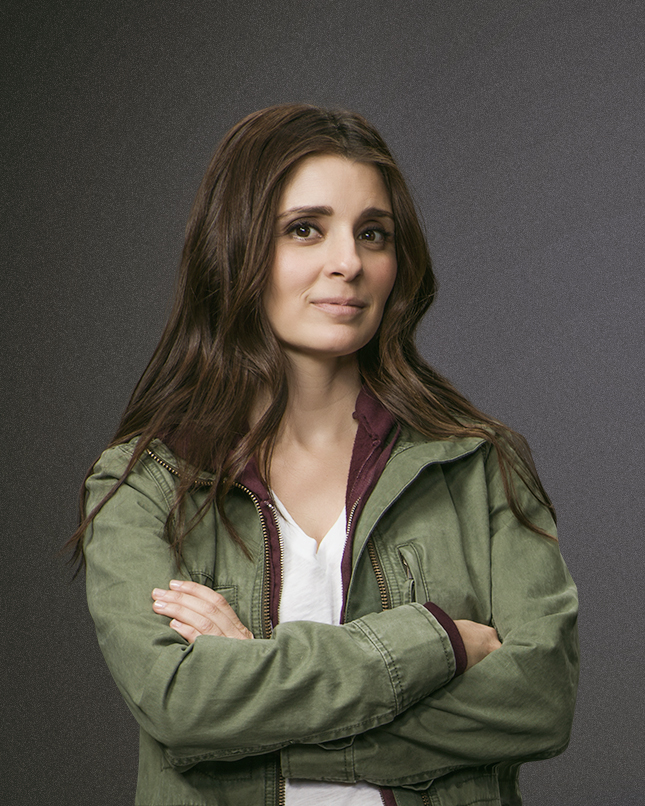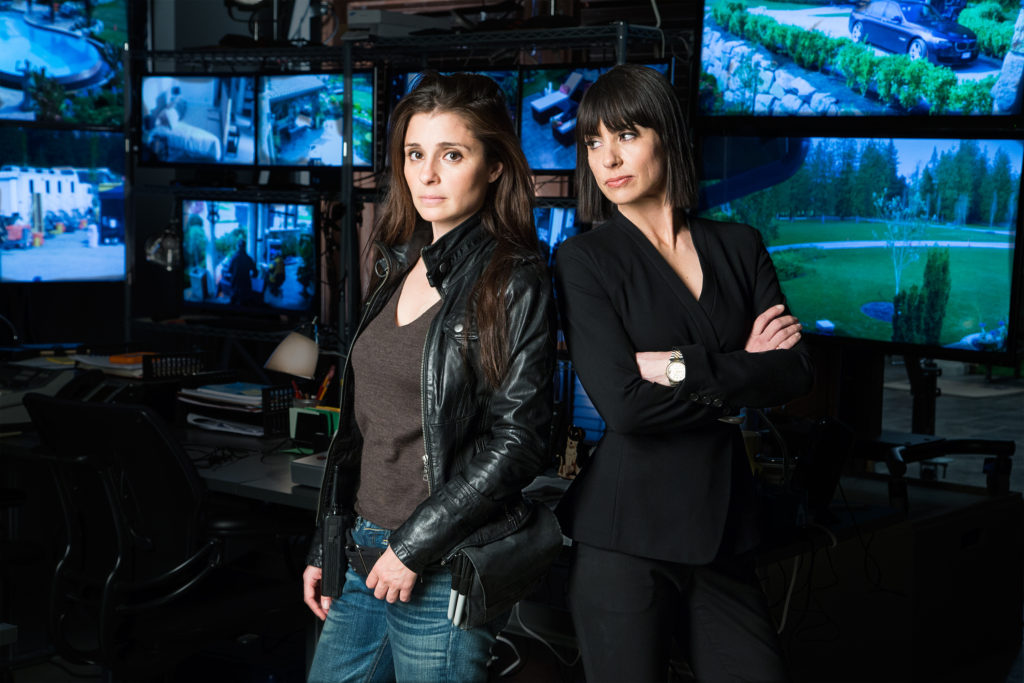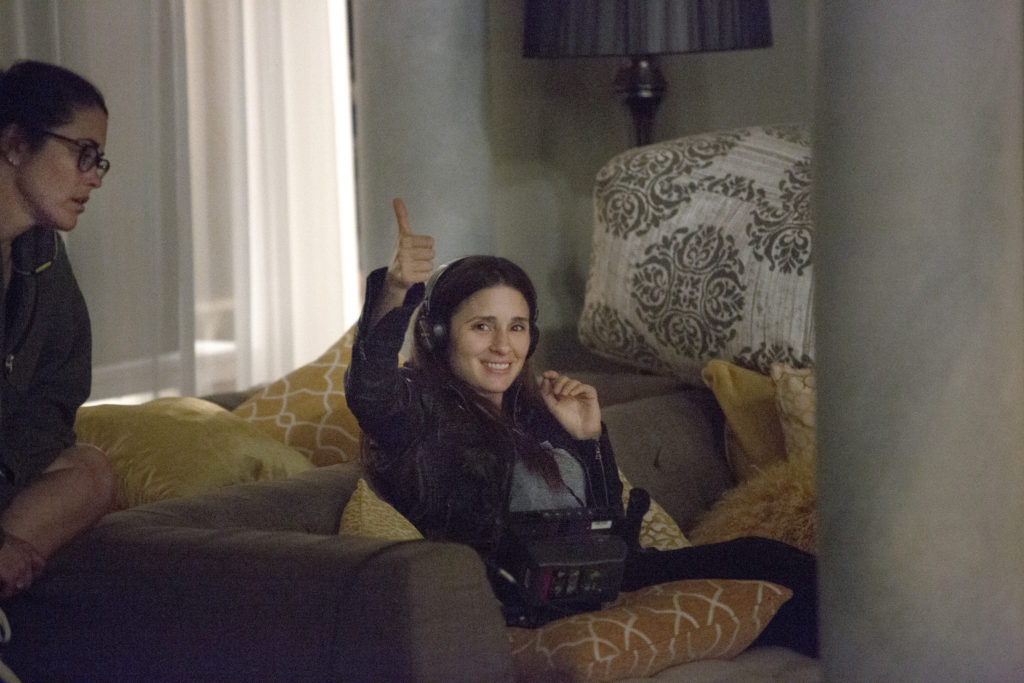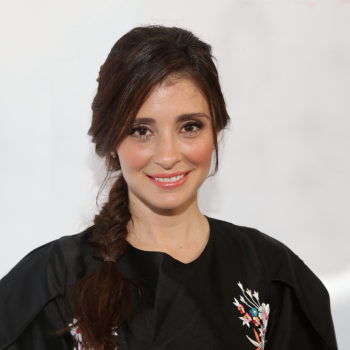You may have seen Shiri Appleby in “Charlie Wilson’s War” opposite Tom Hanks, or in her recurring role on HBO’s “Girls,” or starring in the series “Roswell.” These days, she’s known for her dark star turn as the character Rachel, in the Peabody-winning Lifetime series “UnREAL.”
The show is set behind the scenes at a fictional reality TV dating series called, “Everlasting.” Rachel is one of the show’s producers, and her job is to manipulate female contestants to behave badly on screen. In the process, she manages to sell out almost every moral and ideal she has.
In the clip below, she tells a naive newbie producer what’s expected of her.
Interview highlights
On why reality TV appeals to her and how “UnREAL” has changed her perception of it
Shiri Appleby: I’m not much of a television watcher… in the sense that it’s like watching your work. Like, you want to come home and leave your work behind. But what I do watch of television happens to be reality. Because it’s not, like, my job… So now I watch reality shows with a different eye in the sense that I can now see the manipulation and I can see the producing.
Rico Gagliano: But you couldn’t before?
Shiri Appleby: I mean, I could, but the thing I think about reality television, at least for me, is that it’s sort of mind-numbing. That’s what I appreciate about it, like I can just like turn it on and it’s just escaping life completely.
I think that what was fascinating to me about it before [working on “UnREAL”] was, like, being single, and watching people seemingly fall in love, and asking myself what does it look like to fall in love? How do you fall in love? And wanting to use it, sort of, as research. And now I’m just thinking, “I can’t believe that people are going to such lengths!”
I used to be a big fan of “Real World.” And once it got to New Orleans, and you knew that people were just on to it, it lost its momentum and it lost its importance to me.
Rico Gagliano: Oh, when it had been on long enough that the people appearing on the show knew how they were supposed to act rather than acting naturally.
Shiri Appleby: I was done. Once the girl with Lyme disease left in Seattle, the show’s never really been the same.
On why she loves about her character, Rachel

Shiri Appleby: I mean, I like, love her. I don’t actually think that she is setting out to make the wrong decision. In fact, I think she’s always trying to make the right decision, but her head and the way she processes life is so screwed up that it’s sort of hard to get at that.
I mean, I empathize with her. She’s a character that’s really not had any stability. She’s had a mother that’s been abusive, prescribing her medication for a handful of years. And also, she’s very much looking for connection, but she doesn’t trust the world. So you feel and empathize for a character that so badly wants something that she’s incapable of giving herself.
Rico Gagliano: I also feel, too, that she’s got these principles that she can’t uphold. In this corrupt business and world that just doesn’t value them.
Shiri Appleby: Yes, like, “Can I believe in this?” …You know, she fancies herself a feminist and yet she works on a show that’s really just tearing woman apart.
On what attracted her to a role Vanity Fair called, “the purest TV anti-heroine yet”
Shiri Appleby: When I was auditioning for this part or even making it, I had no idea that what we were doing was going to hit any sort of nerve with having a female anti-hero. I just thought it was going to be maybe a conversation by lifting the curtain on reality television.
I’ve been acting my whole life and… I never knew that women had to act a certain way. Like, my role models — when I would think about television — [were] Murphy Brown, Felicity, Ally McBeal. These were women that were complicated and those were women I gravitated towards watching on television.
Rico Gagliano: And I also never really saw, “Yes, what she’s doing is bad, but she always felt so emotionally confused and conflicted about it.”
Shiri Appleby: Yeah, that I didn’t think that it would be seen as this horrible thing. Quite honestly, it caught me off guard. Do I now see it and see how it’s probably being perceived by the public? Absolutely. And I think it’s very exciting to be a part of that conversation and at least giving women some more freedom in what kind of stories we can tell moving forward.
On how the tension between Rachel and mentor Quinn is different from many female relationships on television
Shiri Appleby: You know, [it’s a] very interesting conversation to see two women in the working world together, whose relationship is based on their work and their professional desires, as opposed to having anything to do with a man or romance.
Rico Gagliano: It passes the Bechdel test.
Shiri Appleby: That’s exactly right.

Rico Gagliano: They’re often having conversations, not about dudes.
Shiri Appleby: Yeah. I mean, this season more so than last, there’s men coming into the picture for both these women. But what’s at the heart of these women is: money, dick, and power.
Rico Gagliano: Which they get…
Shiri Appleby: Tattoos.
Rico Gagliano: I’m going to bleep one of those words, but we’ll say…
Shiri Appleby: Power? Or money?
Rico Gagliano: Nope. They can be dirty words, though.
Shiri Appleby: Especially coming out of a woman’s mouth.
On directing an episode of “UnREAL” and the difficulties of filming a show-within-a-show
Shiri Appleby: We’re always talking about, “These are the ‘Everlasting’ cameras and these are the ‘UnREAL’ cameras.” And so, needing to place the “Everlasting” cameras so that the “UnREAL” cameras can see them. But then at the same time, you have to use your “UnREAL” cameras to capture the “Everlasting” footage.
It’s so crazy! Then, you also have the actress directing the character that is playing the producer, producing the television show. It was like, it’s meta times three.
Rico Gagliano: So how did you deal with it?
Shiri Appleby: I killed it. How did I deal with it? You know, the one thing I learned after I’d say two days was saying “action” was too much. When I was acting, I was like, “Somebody else needs to say action.”

Rico Gagliano: Somebody else, basically, got to do what I think is the coolest part of being a director; say, “Action!”
Shiri Appleby: But, you know, what’s so interesting is a lot of directors don’t say, “Action.”
Rico Gagliano: What do they do?
Shiri Appleby: They let their first AD [Assistant Director] say it.
A lot of directors are so focused on watching the monitors and everything else, or they don’t want to hear their voice, [so] they don’t say it. But then a lot of directors will say “Action” with a different tone or a different register to try to create like an energy on set. So everyone’s really different with how they do it.
On the one question you should never ask her at a dinner party
Shiri Appleby: Oh man. What question? “Do you like the meal? How’s the food?” See my husband is a chef, so whenever we go to dinners, people always want to ask like, “What do you guys think of the food? What do you think of the food?”
Rico Gagliano: Right, like you’re the experts.
Shiri Appleby: Yeah, like, “Oh, are you guys eating the food? Did you think she was a good cook?” And you’re always like, “Oh, please don’t ask us anything about the food. We just want to eat it and go home.”
Rico Gagliano: It’s another example of just wanting to leave your work at your work.
Shiri Appleby: Yeah, just like, we just want to eat!
Rico Gagliano: You can’t escape it.
Shiri Appleby: It’s just food! Or, you know, the food’s terrible, and then you’re just like, “Please don’t make us talk about the food.”
Rico Gagliano: Don’t make us admit to how lousy a job you just did.
Shiri Appleby: That’s exactly right! Or don’t ask us, like, “Where are you guys going to eat after this?”
Rico Gagliano: OK. Where?
Shiri Appleby: Probably Madeo or Jon & Vinny’s, quite honestly.
Rico Gagliano: For those visiting Los Angeles, those are great restaurant recommendations, Jon & Vinny’s, excellent.
Shiri Appleby: My husband’s Jon.
Rico Gagliano: What?!?
Shiri Appleby: Yes.
Rico Gagliano: Very famous, I was not aware of that.
Shiri Appleby: There you go.
On the piece of trivia about her we don’t know
Shiri Appleby: OK, well I’ll tell you something useless about myself. [In high school,] I was yearbook editor for two years. I was also a cheerleader. And I was in leadership, I was a very pro-active participant in my high school experience.
I also filmed my whole high school experience and ended up editing it into a movie. And putting it on VHS tapes and giving them to all my best girlfriends and I can’t find it.
Rico Gagliano: Nobody has a copy of it?
Shiri Appleby: Nobody has a copy of it! It’s the most heartbreaking thing. I literally had a camera, I went around, I was literally David Silver.
Rico Gagliano: Wait, who’s David Silver?
Shiri Appleby: Are you kidding?!?
Rico Gagliano: I don’t know…
Shiri Appleby: Brian Austin Green’s character in the original “90210”?
Rico Gagliano: I’m sorry.
Shiri Appleby: I can’t even believe!
Rico Gagliano: Some people in our production room are like just wincing that I don’t know that reference.
Shiri Appleby: So there, I just told you something you don’t know! Who is David Silver.
Rico Gagliano: Perfect!
[This interview has been edited and condensed]


